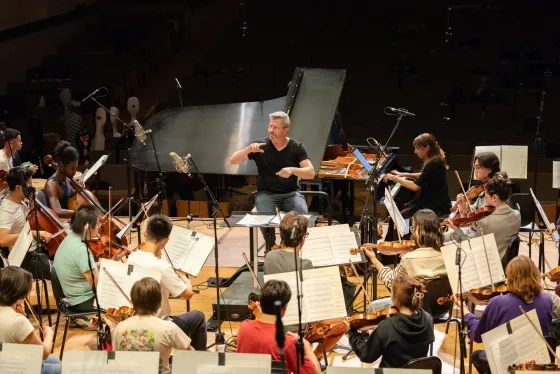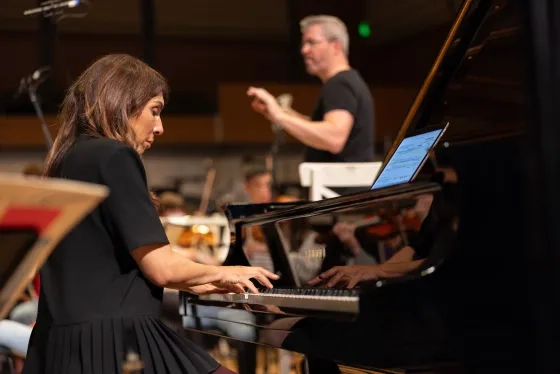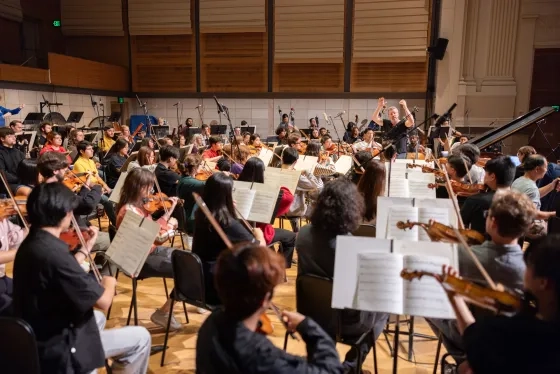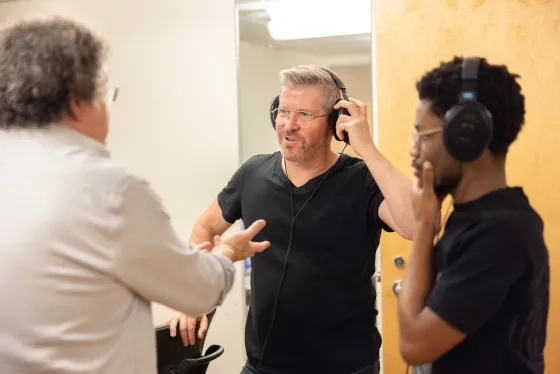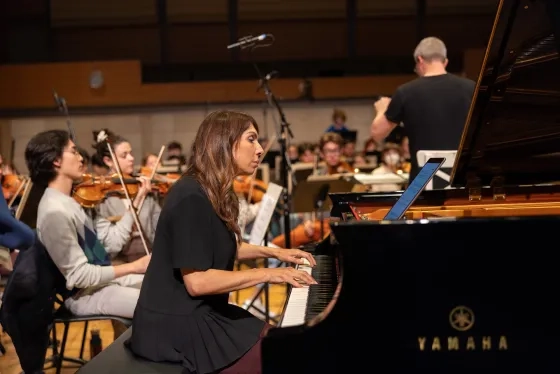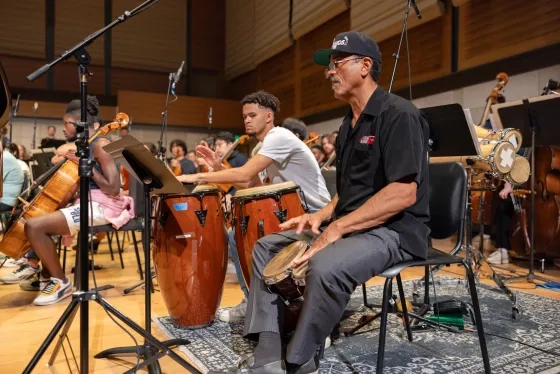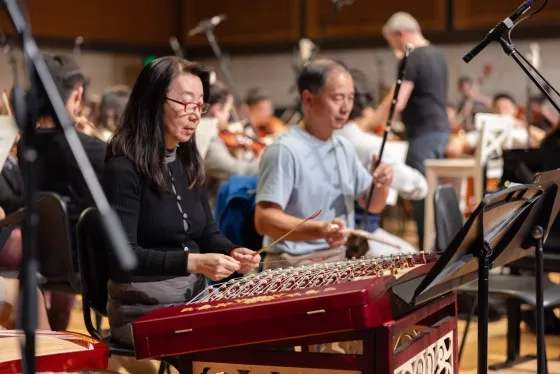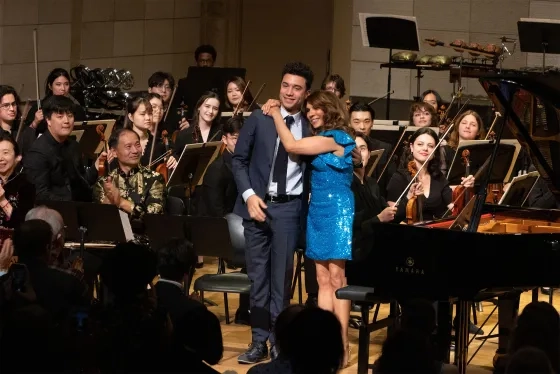SFCM's Orchestra and Pentatone Help Lara Downes Reimagine a 'Rhapsody'
News StoryEdmar Colón's new arrangement was recorded by the SFCM Orchestra by Grammy-winning producer Adam Abeshouse for a release on SFCM's record label, PENTATONE, in 2024.
How do you help a piece as iconic as George Gershwin's Rhapsody in Blue turn 100? That was the question facing Lara Downes—who has a long history with the work—as discussions around the piece's anniversary took shape.
"It all came together so quickly," Downes, a graduate of SFCM's Pre-College program, said. "I was actually here in SFCM last April, visiting with some of the RJAM (Roots, Jazz and American Music) kids with Christian McBride, who's a jazz bassist, and we were talking about all the intersections of these different kinds of music in American culture." Downes called saxophonist/composer/arranger Edmar Colón and commissioned him for the new arrangement after remembering a version of Duke Ellington's "Caravan" he'd done at the Boston Pops Ellington celebration.
"The co-author of that song was Puerto Rican," Downes says, "so Edmar had taken all this percussion, added all these rhythms and things, and like all of a sudden you understood the roots of the song, which is what I wanted to do with 'Rhapsody.' So we had a long conversation, you know, about how to do this imaginatively, creatively, but also respectfully and not as a gimmick."
From there, it was decided that the SFCM Orchestra, under the direction of Edwin Outwater, would play this new arrangement with Colón, Downes, and a host of guest musicians—not just as a public concert, but as a series of recording sessions with the ultimate goal being a forthcoming release on PENTATONE, the record label acquired by SFCM in 2022. (The concert, on Oct. 21, was a sold-out success.)
SFCM Music Director Outwater has performed Rhapsody many times and was keen to preserve some of the historical accuracies—such as how the performers would have swung and articulated their notes at the time—but he still loves the raw power of the piece.
"If you hear the original with Gershwin, I mean, it's nothing short of punk rock. It's extremely aggressive and has kind of ugly and beautiful sounds combined. So, I think the piece has been kind of sanitized and glossed over with time and made into something prettier, you know, than maybe it was meant to be at the beginning."
Gershwin's vision of America's musical melting pot can be seen clearly from Outwater's vantage point onstage: "As a younger orchestra, we have people from Asia and Latin America and people, even from island cultures. So it's very cool to see them and then the Latin percussion and Chinese ensemble happen on stage as well. It's a big vision for American music: What can American music be, with all of these elements coming together? I think with this piece Gershwin was really asking that in an amazing way."
For students—many of whom are involved in a recording project of this magnitude for the first time—Outwater has stressed that it's a valuable piece of training with some big names attached. "The engineer on this, Adam Abeshouse, is a Grammy winner; my last project won a Grammy, Lara is a prolific recording artist. It's a high standard of what recording is, so when the students go out and record themselves, they know the standards they'll be held to and how to work to them."
Jason O'Connell, Technology and Applied Composition (TAC) faculty and SFCM's Director of Recording Services, said "Adam is generous with his knowledge and was an excellent mentor to our students. TAC student Chanho Han was involved with these recording sessions, participating in the design and implementation of the recording system and even standing in as the computer operator when the sessions went long one evening. One of Chanho's goals this year is to produce a full orchestra recording and with the complexity of the Rhapsody project, I have full confidence in his ability a take on a project of that scale."
Alan Jones, a bassist in the Roots, Jazz, and American Music (RJAM) department who played on Rhapsody, said. "The most surprising aspect of the experience to me was the sheer attention to detail that was paid to the recording process. Everything was planned and considered down to the minute, and everybody involved moved through the process with an amount of focus and intensity that was really striking and inspiring for me.
The context surrounding the original Rhapsody is important: Three months after its premiere, the United States passed an immigration act that curbed European immigration but had the unintentional side effect of offering a new route for immigrants from the British West Indies. Among them was Lara’s grandfather, who arrived in Harlem from Jamaica in 1924.
"I actually didn't know that about my grandfather," Downes said. "I met him once when I was a baby, and he died a long time ago. But I had known that this wave of immigration was how Harlem changed significantly, so I went onto Ancestry.com and I found the census records that put my grandfather arriving in 1924, which was really a goosebumps moment."
"I envisioned that the presence of Afro-Caribbean percussion in this arrangement of the piece would add a great deal to the 'new and modern' sonorities and textures being explored within the canvas of such a classic and known musical work," Colón says. "You will hear throughout the course of the piece the following instruments: the batá drums, conga drums, bongó drum, and shekeré within the instrumentation of the orchestra. These instruments represent a direct link to the foundation of African-American music and music in the Americas in general, which is West African music. These are the closest versions to the West African drums that enslaved Africans in the Americas, particularly in Cuba, were able to recreate in order to preserve and revive their customs and idiosyncrasies."
But there's another musical curveball in the arrangement: "Further representing another large immigrant group, the piece includes a traditional Chinese instruments ensemble," Colón said. "This ensemble will appear around the middle section of the piece, performing in a Chinese traditional manner the well-known and beloved slow theme of Rhapsody In Blue." This section was site-specific to San Francisco, reflecting the Chinese-American population of the city; as the project tours, future performances will have guests keyed into the makeup of each city as well.
"I kept thinking about Gershwin in 1924 when he was writing this music," Downes reflects. "He was also reading the newspaper; there was a lot of stuff happening that was informing this work. In recent years I've felt it's hard to connect with being American in many ways, because we're seemingly locked into this cycle of progress where it's one step forward and two back. And the place where I can find not only personal reassurance, but something to celebrate… it's in this piece, this vision of what a true melting pot can look like, and the beauty that can come from that."
Learn more about the SFCM Orchestra, or the SFCM alliance of companies PENTATONE is a part of.
